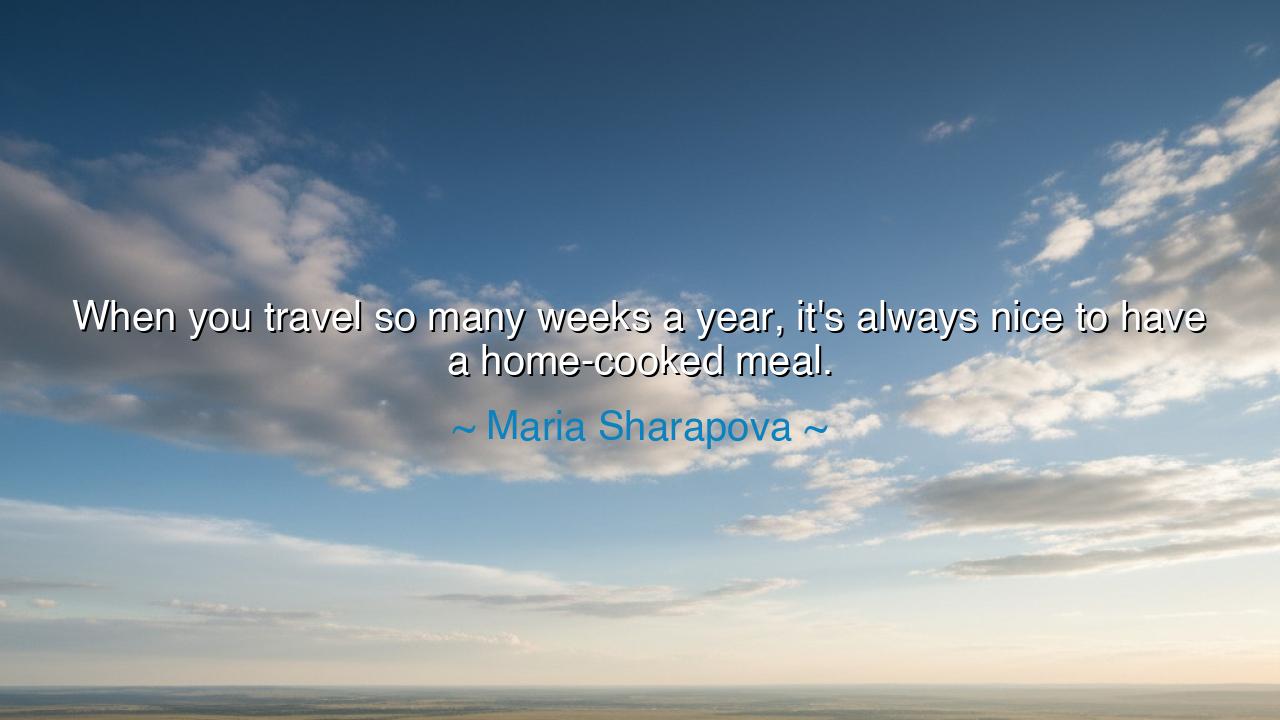
When you travel so many weeks a year, it's always nice to have a






So spoke Maria Sharapova, warrior of the court and traveler across nations: “When you travel so many weeks a year, it’s always nice to have a home-cooked meal.” Though her words seem simple, they carry the fragrance of timeless truth—that no matter how far we wander, no matter how much glory we chase, the soul still longs for the familiar hearth, for the humble comfort of home.
The life of constant travel is both gift and burden. To roam the world is to see wonders, to strive against the best, to taste victory in distant lands. Yet, as Sharapova confesses, the endless journey can leave the heart weary. For even the strongest long not only for conquest, but for rest; not only for applause, but for belonging. And in this longing, the home-cooked meal becomes a symbol of more than food—it is love made tangible, comfort given form, the memory of family and roots that steady the soul.
The ancients knew this hunger well. Recall Odysseus, who fought ten years at Troy and wandered ten more upon the seas. Though he beheld marvels, battled monsters, and was offered immortality by goddesses, his heart never ceased to yearn for his wife’s hearth, for the simple bread and wine of Ithaca. In that tale we see the eternal truth: glory fades, but the warmth of home endures. So too does Sharapova’s confession echo Odysseus’ longing—the heart, though it roams, seeks nourishment not only for the body, but for the spirit.
History too bears witness. Alexander the Great, who conquered lands from Greece to India, wept at the end of his campaigns. Not only for lack of new worlds to conquer, but for the price he paid in distance from the ordinary joys of life. All his banquets and treasures could not match the simple satisfaction of a shared meal in peace. Thus, the mightiest conqueror and the modern athlete are bound by the same truth: the soul craves simplicity even amidst greatness.
And so, Sharapova’s words teach us that even in the pursuit of excellence, we must not despise the ordinary. The home-cooked meal is not merely sustenance—it is remembrance. It reminds us of who we are, where we come from, and what truly matters beyond trophies, riches, or renown. The one who forgets this risks gaining the world but losing themselves.
What, then, must we learn from her wisdom? That we too must seek balance. In our own lives, filled with work, ambition, and endless journeys of duty, we must not neglect the grounding power of simple joys—family dinners, quiet evenings, the company of those who love us without condition. For it is in these moments, as much as in our triumphs, that life finds harmony.
Practically, this means we should carve time for rest, no matter how busy our travels—whether across countries or across tasks of the day. Share meals with loved ones, prepare food with your own hands, and taste in it not only nourishment, but gratitude. Remember that the feast of life is not in constant striving, but in moments of peace that root us in love.
Thus, Sharapova’s reflection becomes a teaching for the ages: “When you travel so many weeks a year, it’s always nice to have a home-cooked meal.” For in that meal lies the eternal truth—that beyond our journeys, beyond our victories, the sweetest triumph is to come home, and to know that we are cared for, nourished, and at rest.






AAdministratorAdministrator
Welcome, honored guests. Please leave a comment, we will respond soon